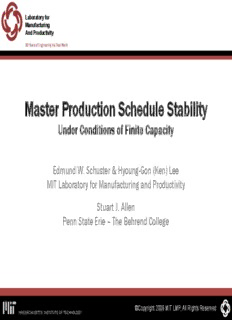
Master Production Schedule Stability - APICS North Shore Chapter PDF
Preview Master Production Schedule Stability - APICS North Shore Chapter
Laboratory for Manufacturing And Productivity 30 Years of Engineering the Real World Master Production Schedule Stability Under Conditions of Finite Capacity Edmund W. Schuster & Hyoung-Gon (Ken) Lee MIT Laboratory for Manufacturing and Productivity Stuart J. Allen Penn State Erie – The Behrend College ©©CCooppyyrriigghhtt 22000088 MMIITT LLMMPP,, AAllll RRiigghhttss RReesseerrvveedd Laboratory for INFORMATION Manufacturing And Productivity 30 Years of Engineering the Real World Email: [email protected] Web Site: http://mit.edu/edmund_w/www/ Blog: http://ingehygd.blogspot.com/ ©Copyright 2008 MIT LMP, All Rights Reserved Laboratory for WHAT I WILL DISCUSS TODAY Manufacturing And Productivity 30 Years of Engineering the Real World Master I. Bias adjusted safety stock Bias Adjusted Production Safety Stock Scheduling II. Master production scheduling - MODS (Modified Dixon Silver Heuristic) Open System III. Open system - Way of layering and delivering models using Internet IV. Simulation - Performance measure - Stability V. Conclusion 2/19 ©Copyright 2008 MIT LMP, All Rights Reserved Laboratory for SAFETY STOCK Manufacturing And Productivity 30 Years of Engineering the Real World Why would you ever need to carry safety stock? - Are backorders acceptable to you? - JIT(Just-In-Time) production vs. make-to-stock type production 3/19 ©Copyright 2008 MIT LMP, All Rights Reserved Laboratory for MASTER PRODUCTION SCHEDULING Manufacturing And Productivity 30 Years of Engineering the Real World Forecasts of Demand Aggregate Plan Master Production Schedule Schedule of Production Quantities by production and time period Materials Requirements Planning System Explore master production schedule to obtain requirements for components Detailed Job Shop Schedule To meet specification of production quantities from the MRP system 4/19 ©Copyright 2008 MIT LMP, All Rights Reserved (OPEN SYSTEM) Laboratory for Manufacturing MASTER PRODUCTION SCHEDULING And Productivity 30 Years of Engineering the Real World • Master Scheduling Model along with Open Systems – Open source versus open systems – Powerful trend in the computer industry: Salesforce.com, Netsuite • M Language (since 2003) and other web standards – Semantic connections for models and data via the Internet – http://mlanguage.mit.edu • Software as a Service – Access a sophisticated scheduling model on a remote server using an Excel spreadsheet interface that can reside on any microcomputer with Internet link – Match a specific model to a specific problem – Create a world-wide standard for a specific MPS problem – Provide a way of “layering” models • No implementation of model on local system, access is immediate – No storage of data on the server 5/19 ©Copyright 2008 MIT LMP, All Rights Reserved Laboratory for ARCHETYPAL MPS Manufacturing And Productivity 30 Years of Engineering the Real World • Do not integrate statistical safety stock planning into algorithms or heuristics • Make no provision for type 1 or type 2 customer service levels (ability to meet demand Vs total percentage of cases shipped) • Do not account for forecast bias • Assume independent demand is “deterministic” • Accept forecast at face value • Can not find optimal solutions for sequencing and lot sizing problems under situations with dynamic safety stock 6/19 ©Copyright 2008 MIT LMP, All Rights Reserved CLASSIC STATISTICAL THEORY Laboratory for Manufacturing AS APPLIED TO SAFETY STOCK And Productivity 30 Years of Engineering the Real World • Typically, the amount of safety stock is incorporated in replenishment planning process as a fixed reserved quantity, which would be: * where k = multiplier based an desired service level MAD = Mean Absolute Deviation between forecast and actual demand LT = lead time • Major Flaw – It is not appropriate in “lumpy demand” situation OR where “forecast bias” is likely to occur all the time – Kakorous et al., 2002, Measure, then manage, APICS – The Performance Advantage, 12(10) * Krupp, 1997, Safety Stock Management, Prod. Inv. Mgt. 38(3) 7/19 ©Copyright 2008 MIT LMP, All Rights Reserved BIASED ADJUSTED SAFETY STOCK Laboratory for Manufacturing MODEL ENHANCED FROM KRUPP(1997) And Productivity 30 Years of Engineering the Real World • A mechanism to apply the safety stock to future demand in a dynamic manner based on forecast bias where k = multiplier based an desired service level u = future forecasted demand per week n TICF = Time Increment Contingency Factor , a measure of variability applied to the real forecast u n (%) FETS = Forecast Error Tracking Signal, a measure of forecast bias LT = lead time 8/19 ©Copyright 2008 MIT LMP, All Rights Reserved SOLUTION METHODS FOR MPS Laboratory for Manufacturing And Productivity 30 Years of Engineering the Real World Attribute Math Prog. Simulation Heuristic Hold Time X X Queue Time X X Customer Service X Forecast Bias X Set-up Cost X X Holding Cost X X Overtime Cost X X Capacity X X Production Lot-Size X X Production Sequence X X Customer Due Date X X X Family Structure X X : Functional 9/19 ©Copyright 2008 MIT LMP, All Rights Reserved
Description: